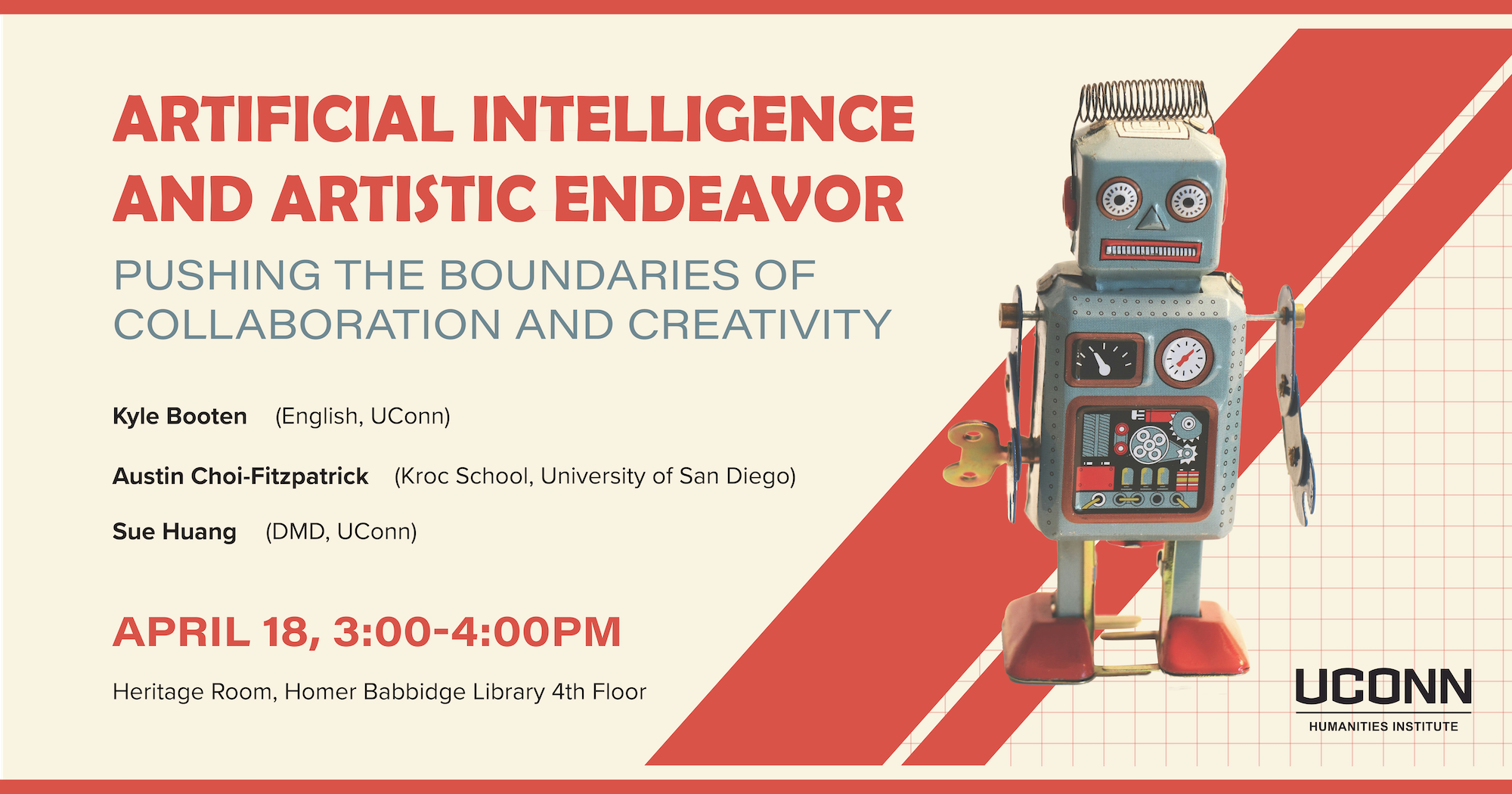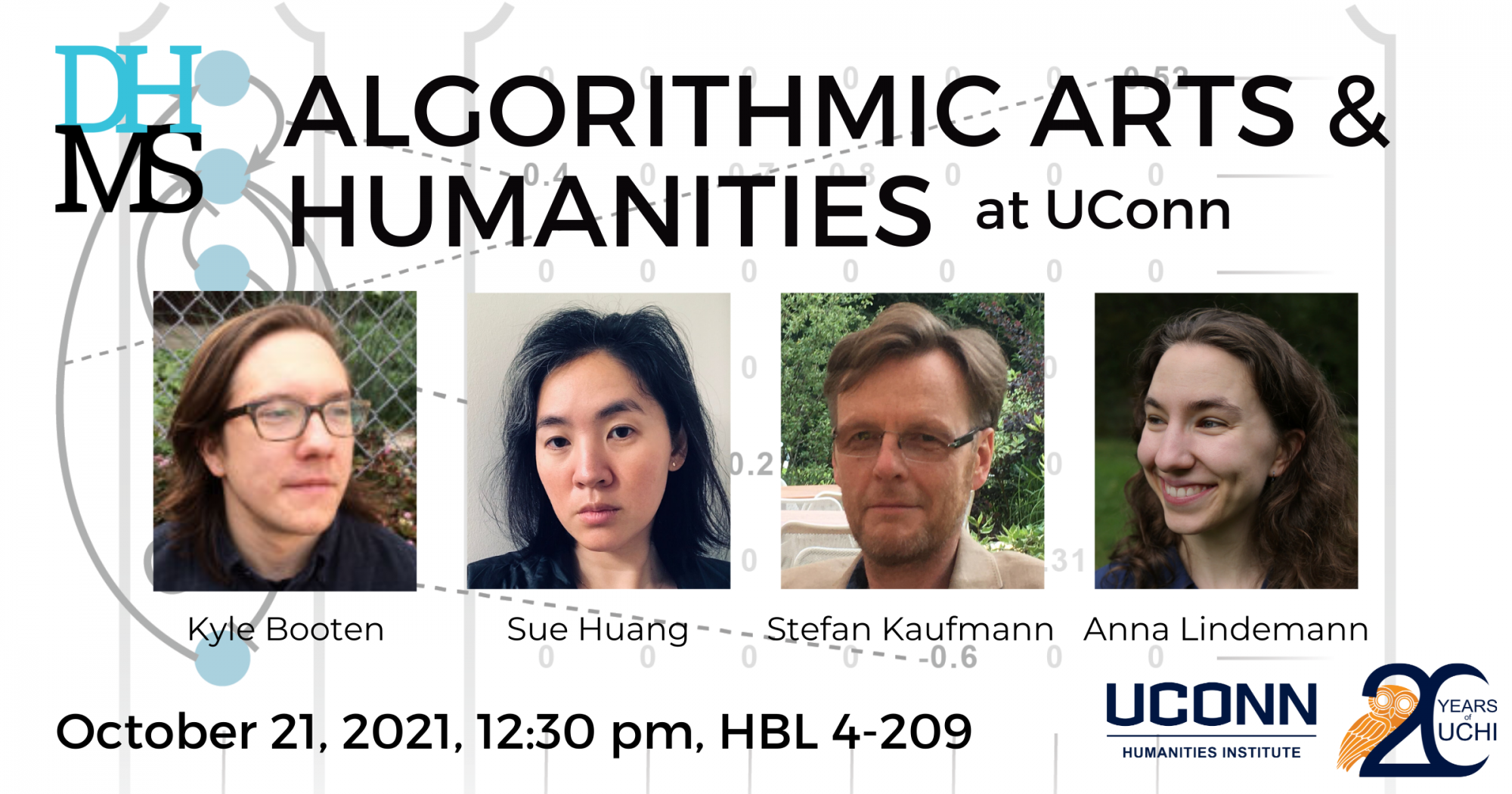Artificial Intelligence and Artistic Endeavor: Pushing the Boundaries of Collaboration and Creativity
Kyle Booten (English, UConn)
Austin Choi-Fitzpatrick (Kroc School, University of San Diego)
and Sue Huang (DMD, UConn)
Thursday, April 18, 2024, 3:00pm, Heritage Room, HBL Library, 4th Floor
The event will also be livestreamed with automated captioning.
Join us for an engaging discussion with Austin Choi-Fitzpatrick, human rights expert and member of an artists’ collective; Kyle Booten, co-founder of a literary journal dedicated to human-AI co-authored works; and Sue Huang, a visual artist who collaborates with AI. Together, they will explore how AI challenges us to reassess and redefine the concepts of collaboration and creativity.
“Smooth and Jagged Substrates of Thought,” Kyle Booten
In this talk, I’ll suggest that we should care less about whether or not computer-generated text can be “creative” and more about what sorts of human creativity can grow on top of it, on its surface—much the way lichen grows on bark. Sharing examples of my own work designing algorithmic writing assistants, I will suggest that AI-generated text is often unfortunately “smooth,” and I will share some tactics that I used in my recent book (Salon des Fantômes, Inside the Castle, 2024) to try make it more “jagged” and, perhaps, better for cultivating interestingly-shaped thoughts upon.
“Connective Creativity—Why Art is Collective Action, and How that Matters in the Age of AI,” Austin Choi-Fitzpatrick
“AI, Ecological Intimacies, and the Disappearing Landscape,” Sue Huang
Huang will present recent research which uses AI, scientific “found data” and natural language processing methods for exploring ecological intimacies between humans and nonhumans. In particular, she will speak about her current project Total Archive, a sci-fi performance and installation piece that explores a series of speculative government reports and “strange” objects found in a time capsule from the future. Prepared by an intern working at a government agency, these documents and artifacts reveal an ecological system in its final throes. The project presents poetry written in part by a fine-tuned AI that processes materials from digitized Smithsonian scientific field books and Internet-found amateur written erotica stories. Visuals in the video installation are derived from text-to-image AI and recombinatory methods that hybridize creatures from over 45,000 species listed in the IUCN Red List of Threatened Species database.
Kyle Booten is an assistant professor of English at the University of Connecticut, Storrs. His research explores the ways that small-scale, personalized algorithmic systems may be designed to care for one’s own mind. He is the author of Salon des Fantômes (Inside the Castle, 2014), a book that documents a philosophical salon he attended with a cast of AI-fabricated characters, and the creator of Nightingale, a web extension that re-distracts the user with contextually-relevant excerpts from the poetry of John Keats (available in the Chrome Web Store). His poetry written with algorithmic feedback and interference has been published in Fence, Lana Turner, and Blackbox Manifold; his scholarly writing has recently appeared or is forthcoming in electronic book review, Critical AI, and xCoAx ’23.
Austin Choi-Fitzpatrick is an author, educator, and speaker. His work focuses on politics, culture, technology, and social change. His recent books include Wicked Problems (Oxford, 2022), The Good Drone (MIT Press, 2020) and What Slaveholders Think (Columbia, 2017), and his commentary includes articles in Slate, Al Jazeera, and the Guardian and appearances on BBC, NBC, and Fox News. Austin lives in California and holds academic appointments at the University of San Diego and the University of Nottingham.
Sue Huang is a new media artist whose work addresses collective experience. Her research explores ecological intimacies, human/nonhuman relations, and speculative futures. She is currently working on the project Total Archive, a performance work about a time capsule from the future. This project is supported by the Culture Council of the Emerson Collective and Leonardo @ Djerassi for 2024. Huang has exhibited nationally and internationally, including at the Museum of Contemporary Art (MOCA), Los Angeles; the Contemporary Arts Center (CAC) in Cincinnati; Philadelphia Contemporary; ISEA in Montreal; and Ars Electronica in Linz, Austria; among others. She has previously been an artist-in-residence at LMCC on Governors Island, Creative Science at NEW INC, and the Studios at MASS MoCA. Huang has received funding and project support from Science Sandbox, Rhizome, the James Irvine Foundation (MOCA, Los Angeles), and Creative Scotland (NEoN), the UConn Humanities Institute, among others.She received her MFA in Media Arts at the University of California, Los Angeles (UCLA) and her BS in Science, Technology, and International Affairs from the Walsh School of Foreign Service at Georgetown University. She is an assistant professor of Digital Media and Design at the University of Connecticut.
Access note
If you require accommodation to attend this event, please contact us at uchi@uconn.edu or by phone (860) 486-9057. We can request ASL interpretation, computer-assisted real time transcription, and other accommodations offered by the Center for Students with Disabilities.



